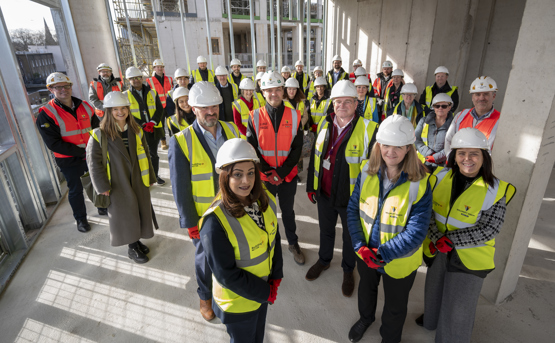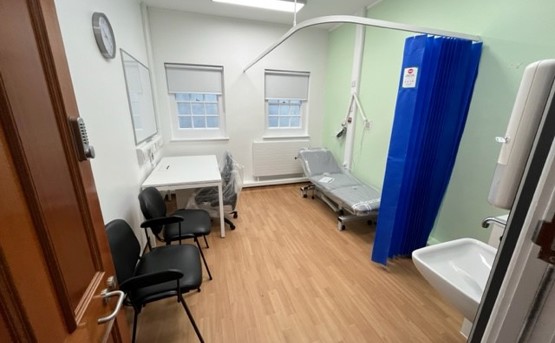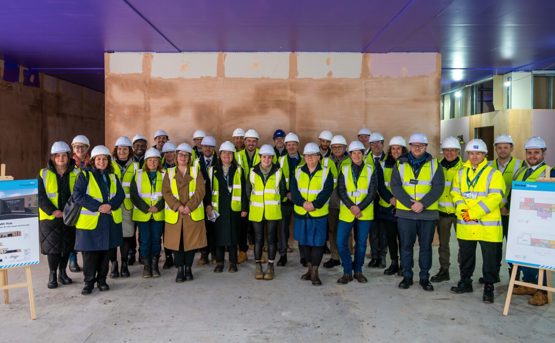
Published date: 13 October 2020
Development of a new Community Hospital
Hythe and Dibden War Memorial Hospital, Hampshire
Background
Site: an NHSPS-owned community hospital, comprising of two buildings: an old hospital (from the 19th century) and an adjoining medical centre (built in 1965) across approx. 1.5 hectares.
Customers/stakeholders: West Hampshire Clinical Commissioning Group (CCG), Isle of Wight Sustainability and Transformation Partnership (STP) Waterside Primary Care Network (PCN), New Forest District Council, League of Friends, NHS England & Improvement
NHSPS representatives: Susan Swaffer, Regional Partnership Director – South East, Alan White, Principal Portfolio Optimisation Manager, Adam Shepheard, Principal Construction Manager
Customer feedback
“We’re really excited to be taking these final steps in the redevelopment of Hythe and Dibden War Memorial Hospital. We would like to thank the local community and the League of Friends for all their hard work and support in now making this a reality.”
Dr Sarah Schofield, Clinical Chairman of West Hampshire Clinical Commissioning Group
Challenge
The need for the redevelopment of Hythe and Dibden War Memorial Hospital has long been felt and has been in progress since the Hythe Hospital Local Development Group was established in 2009. Various local commissioning and estate strategies have highlighted this need, finding the site in need of major repairs and upgrades to continue offering quality patient care.
As well as improving the site quality, there’s also a significant opportunity for rationalisation and subsequent cost efficiencies. Services require significantly less space than their current accommodation since the closure of inpatient beds in 2010.
NHSPS and West Hampshire Clinical Commissioning Group (WHCCG) set out to find a solution, accelerating in the past few years to provide a new and fit for purpose health and wellbeing centre for the community.
The solution
The NHSPS Portfolio Optimisation team developed and assessed a range of options for the project, scoping out requirements and supporting the CCG through public consultation. The option of a new build was chosen, as opposed to consolidating services into one of the two existing buildings. In the interim the old hospital building was decommissioned, with all services amalgamated to the medical centre.
Our Town Planning team then supported the new build’s application, getting planning consent granted in 2018. We then helped WHCCG develop an Outline Business Case to secure the funding, which was approved by NHS England in 2019.
Some delays to the project development and approvals has caused construction costs to increase (e.g. impact of Brexit on availability of materials, and Covid-19 changing how we work on site). However, the ~£1 million gap between NHSE funding and project cost will be filled by our capital recycling scheme, i.e. the money released from selling surplus land on site will be reinvested into the project.
Both NHSPS and WHCCG secured Full Business Case approval in June 2020, and – dependent on final approvals from NHSE/I – we plan for construction to commence in Autumn 2020 and completing in May 2022.
The impact
This redevelopment is a great example of local level collaboration, with NHSPS and CCG teams working closely to accelerate this legacy project. The new Hythe and Dibden War Memorial Hospital will serve as a local ‘Area Hub’, supporting the CCG and STP’s integrated care strategy for the 80,000+ population of South West Hampshire.
The new building will provide a welcoming, inclusive, fit for purpose and high-quality facility, creating a positive experience for patients, visitors and the staff caring for them.
It will be run on a significantly smaller footprint, making it more cost efficient as well as releasing surplus land for disposal – generating funds to reinvest into the NHS.
A reduced footprint doesn’t mean reduced services, however, and by using the accommodation more efficiently (using flexible room booking and a seven day a week schedule), there will be capacity to continue existing services as well as opening opportunities to bring an expanded range of health and wellbeing services to the site. Indeed, it will increase the integration of services through co-location, building more integrated and coordinated care.
An increased provision of care closer to home (including minor surgery, expanded diagnostic services and more dementia care) will reduce pressure from nearby Acute centres, with more patients being safely supported in their local community setting or at home.
Partner feedback
“This is such good news for the local community and has been long awaited. We are so pleased that we can now progress with the construction of the building which will continue to provide a variety of much valued clinical services and maintain its importance as the war memorial.”
John Carr, Chairman of the Hospital League of Friends





